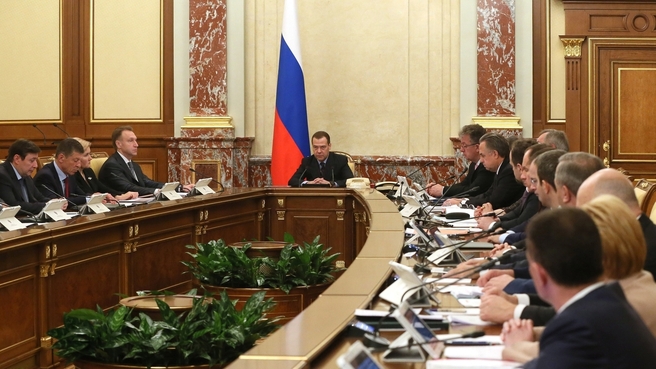Excerpts from Dmitry Medvedev’s opening remarks at a Government meeting.
<…>
Dmitry Medvedev: As you know, the International Olympic Committee took the decision to
suspend the Russian Olympic Committee and made it impossible for our athletes to
compete under the Russian flag. In this context, I would like to say a few
words, taking into consideration the position articulated yesterday by the
President of Russia, as well as the Government’s perspective, since all this
also affects our work.
First of all, the decision clearly has a fact-based and a political side. It is obvious that there was a doping issue in Russian sport, and we openly recognised this. We launched proactive efforts to address it. An Independent Public Anti-Doping Commission was established, as you may recall. A special plan, called the National Plan to Fight Doping in Russian Sport, was adopted alongside a package of measures to implement this plan. This goes to say that we started serious work. I’m not even talking about amendments to administrative offences legislation and the Criminal Code. We developed informational and educational programmes to prevent anti-doping rule violations by athletes and team staff.
This line of action or policy continues to this day, so we have not given up on any of these initiatives. On the contrary, we have been keeping up this momentum no matter the context of any decisions, and will continue moving in this direction in the future.
Today, I signed a government directive to incorporate the Anti-Doping Centre into Lomonosov Moscow State University as its structural unit in order to better fulfil the requirements regarding the financial and administrative independence of the future national anti-doping laboratory. I hope that his will also improve the overall quality of anti-doping tests, since they will be performed at one of the best universities in the world that has everything that may be needed in this respect.
I would also like to draw your attention to the fact the last 1,500 samples collected from Russian athletes were clean. This means that the situation with the abuse of performance-enhancing drugs is changing, and these changes are radical. It may be that the current situation is not better than in other countries, but it is certainly not worse.
We know examples of athletes suffering from various medical conditions (although we can judge about their illnesses only from their statements that no one can verify) being allowed to compete for their teams while taking forbidden substances. There were also cases of athletes taking medications identical to meldonium in terms of their chemical composition, and those athletes were also allowed to compete, while Russian athletes were disqualified.
In this context, as both my colleagues and I have said on numerous occasions, the definition of doping is extremely vague and flawed. However, no one is doing anything about it. It may be that it suits many.
It’s a real shame that clean athletes face unfair treatment of this kind. These athletes and our country in general faced these unprecedented and groundless accusations levied against an entire state. As you know, these accusations were based on the testimony of a single person, who is frankly mentally infirm. This is a person with obvious psychopathic deviations who engaged in criminal activity which consisted of doping athletes.
Of course, all this does not help when it comes to a fair investigation. The Schmid Commission was unable to verify many of these accusations for the very simple reason that they were an outright lie, specifically, regarding the existence of a state-sponsored doping system. Nevertheless, they continue demanding that we recognise the existence of such programmes. This will never happen. We cannot and will not recognise deceitful conclusions.
Second, there is another aspect to the decision by the International Olympic Committee that is also easy to understand, especially in today’s environment. I am referring to the political side of the issue. This decision was taken in the run-up to the presidential election in Russia with a view to affecting the general mood in the country. There is a clear understanding abroad of the immense importance of high performance sport for people in Russia just as in many other countries. Every two years the whole country follows with great enthusiasm the Olympic competitions and cheers for its athletes.
This decision was a heavy blow for millions of Russians, and a real tragedy for many Russian athletes. After all, the South Korean Olympics were the last chance for many of them to compete for Olympic medals. Unfortunately, the sports career of an athlete is brief, for understandable reasons. Denying these athletes a chance to compete in the Olympics is like breaking their lives. Of course, those who will be invited will have to decide by themselves whether to go to the Olympics. No one, neither the federations, nor officials, have the right to tell them what to do. This is their personal choice. As far as the Government is concerned, let me assure you that the athletes have our support no matter what they decide.
Those who will go to the Olympics will have our usual support as Russian athletes, and we will also support those who were deprived of this possibility. The Government needs to draft proposals on ways of supporting them. I would like to ask the Deputy Prime Minister in charge of this area and the Minister of Sport to work this matter out and report to me on their proposals.
<…>













